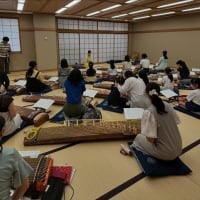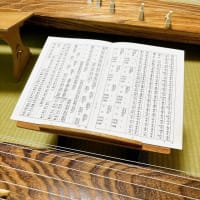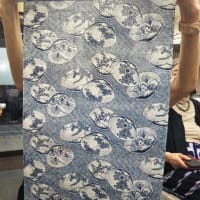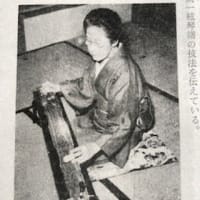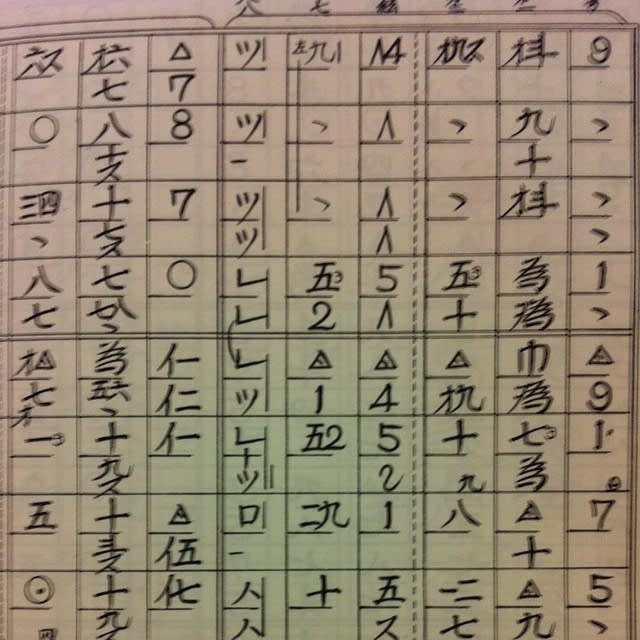
本日の記事は、アッシュビルよりお届けします。
日本や海外でのイベントで演奏やワークショップを行うと、さまざまな質問をお受けします。
特に多いのがお箏の材質や楽譜についてです。
和楽器の楽譜は、五線譜とは全く異なります。
お箏の13本の弦には、それぞれ番号と名前が付いています。
一番遠いところから、漢字の番号で一から十。
11から13は、斗(と)、為(い)、巾(きん)という名前がついています。
楽譜にはいろいろな種類があり、流派によって異なる事があります。
私たちは通常、上から下、右から左に読むスタイルの楽譜を使用します。
(横書きや、左から右にめくる楽譜もあります)
写真の楽譜はお箏、十七絃、胡弓、三味線、尺八を組み合わせた合奏用の楽譜です。
箏と同様に、17弦の箏は漢字で一から十、11から17には数字の番号が付けられています。
小さな「オ」や「ヲ」は、左手で弦を押して半音や一音を上げる記号です。
他にも、さまざまなテクニックを指示する記号があります。
これらの楽譜は約80年前に作り始められたそうです。
それまでのお稽古はすべて口承で行われ、生徒は先生の演奏を聞いて、弾き方を見て覚えていたそうです。
他の写真の多くは、2015年クロアチアのザグレブ大学にてワークショップを行った時のものです。
クロアチア、スロベニアの演奏ツアーにつきましては、次のリンク先でご覧ください。
https://mionokaiinfo.jimdofree.com/workshop/
(文;三上)
In Japan as well as here in Asheville, when I playing koto at an event and workshop, I used to be asked questions about the sheet music.
How it looks like and how to read it.
It is completely different from the sheet music of the staff notation.
The 13 strings, a regular koto, have a number and a name on each string.
From the farthest, one to ten assigned number in Kanji. Eleven to thirteen has different name "斗To" "為 E" and "巾 Kin".
There are several different styles of sheet music. It depends on the school.
We usually use this style of the sheet music, which reads from top to bottom and from right to left.
The photo is an ensemble sheet music that combines 17-string base koto, kokyu, shamisen, and shakuhachi.
Like the koto, the 17-string base koto is numbered 1 to 10 in kanji and 11 to 17 in number.
The small "オ(O)" and "ヲ(WO)" are symbols that change the tone by pressing a string with left hand. There are other symbols that indicate different techniques.
These sheet music were developed about 80 years ago.
Until then, all lessons were verbal and students had to hear (see) and remember from the teacher.
The photos are at a workshop at the University of Zagreb in Croatia in 2015.
The link below is that reports.
https://mionokaiinfo.jimdofree.com/workshop/

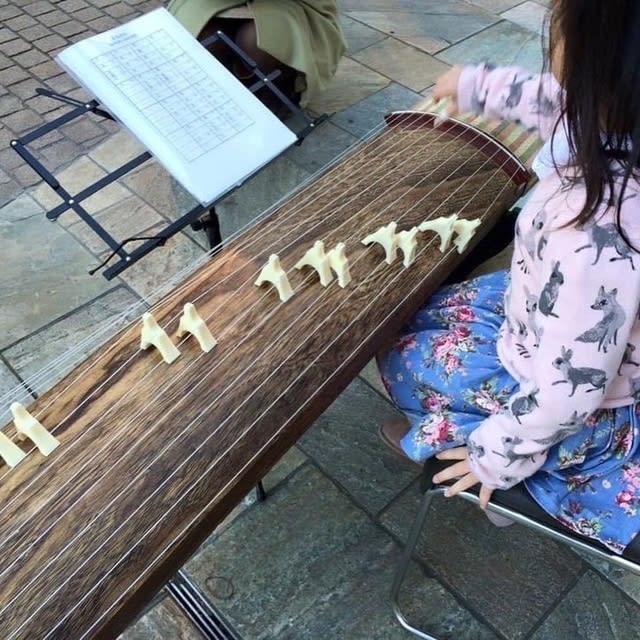
日本や海外でのイベントで演奏やワークショップを行うと、さまざまな質問をお受けします。
特に多いのがお箏の材質や楽譜についてです。
和楽器の楽譜は、五線譜とは全く異なります。
お箏の13本の弦には、それぞれ番号と名前が付いています。
一番遠いところから、漢字の番号で一から十。
11から13は、斗(と)、為(い)、巾(きん)という名前がついています。
楽譜にはいろいろな種類があり、流派によって異なる事があります。
私たちは通常、上から下、右から左に読むスタイルの楽譜を使用します。
(横書きや、左から右にめくる楽譜もあります)
写真の楽譜はお箏、十七絃、胡弓、三味線、尺八を組み合わせた合奏用の楽譜です。
箏と同様に、17弦の箏は漢字で一から十、11から17には数字の番号が付けられています。
小さな「オ」や「ヲ」は、左手で弦を押して半音や一音を上げる記号です。
他にも、さまざまなテクニックを指示する記号があります。
これらの楽譜は約80年前に作り始められたそうです。
それまでのお稽古はすべて口承で行われ、生徒は先生の演奏を聞いて、弾き方を見て覚えていたそうです。
他の写真の多くは、2015年クロアチアのザグレブ大学にてワークショップを行った時のものです。
クロアチア、スロベニアの演奏ツアーにつきましては、次のリンク先でご覧ください。
https://mionokaiinfo.jimdofree.com/workshop/
(文;三上)
In Japan as well as here in Asheville, when I playing koto at an event and workshop, I used to be asked questions about the sheet music.
How it looks like and how to read it.
It is completely different from the sheet music of the staff notation.
The 13 strings, a regular koto, have a number and a name on each string.
From the farthest, one to ten assigned number in Kanji. Eleven to thirteen has different name "斗To" "為 E" and "巾 Kin".
There are several different styles of sheet music. It depends on the school.
We usually use this style of the sheet music, which reads from top to bottom and from right to left.
The photo is an ensemble sheet music that combines 17-string base koto, kokyu, shamisen, and shakuhachi.
Like the koto, the 17-string base koto is numbered 1 to 10 in kanji and 11 to 17 in number.
The small "オ(O)" and "ヲ(WO)" are symbols that change the tone by pressing a string with left hand. There are other symbols that indicate different techniques.
These sheet music were developed about 80 years ago.
Until then, all lessons were verbal and students had to hear (see) and remember from the teacher.
The photos are at a workshop at the University of Zagreb in Croatia in 2015.
The link below is that reports.
https://mionokaiinfo.jimdofree.com/workshop/















